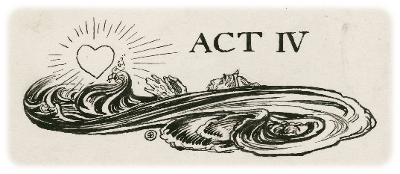King Lear
Act IV, Scene 1

A heath.
- Enter Edgar.
Edgar
1 - 13- Yet better thus, and known to be contemn’d,
- Than still contemn’d and flatter’d. To be worst,
- The lowest and most dejected thing of fortune,
- Stands still in esperance, lives not in fear.
- The lamentable change is from the best,
- The worst returns to laughter. Welcome then,
- Thou unsubstantial air that I embrace:
- The wretch that thou hast blown unto the worst
- Owes nothing to thy blasts.
- Enter Gloucester led by an Old Man.
- But who comes here?
- My father, parti-ey’d? World, world, O world!
- But that thy strange mutations make us hate thee,
- Life would not yield to age.
Old Man
14 - 16- O my good lord,
- I have been your tenant, and your father’s tenant,
- These fourscore years.
Gloucester
17 - 19- Away, get thee away! Good friend, be gone,
- Thy comforts can do me no good at all;
- Thee they may hurt.
Old Man
20- You cannot see your way.
Gloucester
21 - 27- I have no way, and therefore want no eyes;
- I stumbled when I saw. Full oft ’tis seen,
- Our means secure us, and our mere defects
- Prove our commodities. O dear son Edgar,
- The food of thy abused father’s wrath!
- Might I but live to see thee in my touch,
- I’ld say I had eyes again.
Old Man
28- How now? Who’s there?
Edgar
29 - 30- Aside.
- O gods! Who is’t can say, “I am at the worst”?
- I am worse than e’er I was.
Old Man
31- ’Tis poor mad Tom.
Edgar
32 - 33- Aside.
- And worse I may be yet: the worst is not
- So long as we can say, “This is the worst.”
Old Man
34- Fellow, where goest?
Gloucester
35- Is it a beggar-man?
Old Man
36- Madman and beggar too.
Gloucester
37 - 43- He has some reason, else he could not beg.
- I’ th’ last night’s storm I such a fellow saw,
- Which made me think a man a worm. My son
- Came then into my mind, and yet my mind
- Was then scarce friends with him. I have heard more since.
- As flies to wanton boys are we to th’ gods,
- They kill us for their sport.
Edgar
44 - 46- Aside.
- How should this be?
- Bad is the trade that must play fool to sorrow,
- Ang’ring itself and others.—Bless thee, master!
Gloucester
47- Is that the naked fellow?
Old Man
48- Ay, my lord.
Gloucester
49 - 53- Then prithee get thee away. If for my sake
- Thou wilt o’ertake us hence a mile or twain
- I’ th’ way toward Dover, do it for ancient love,
- And bring some covering for this naked soul,
- Which I’ll entreat to lead me.
Old Man
54- Alack, sir, he is mad.
Gloucester
55 - 57- ’Tis the time’s plague, when madmen lead the blind.
- Do as I bid thee, or rather do thy pleasure;
- Above the rest, be gone.
Old Man
58 - 59- I’ll bring him the best ’parel that I have,
- Come on’t what will.
- Exit.
Gloucester
60- Sirrah, naked fellow—
Edgar
61 - 62- Poor Tom’s a-cold.
- Aside.
- I cannot daub it further.
Gloucester
63- Come hither, fellow.
Edgar
64- Aside.
- And yet I must.—Bless thy sweet eyes, they bleed.
Gloucester
65- Know’st thou the way to Dover?
Edgar
66 - 72- Both stile and gate, horse-way and foot-path. Poor Tom hath
- been scar’d out of his good wits. Bless thee, good man’s
- son, from the foul fiend! Five fiends have been in poor Tom
- at once: of lust, as Obidicut; Hobbididence, prince of
- dumbness; Mahu, of stealing; Modo, of murder;
- Flibbertigibbet, of mopping and mowing, who since possesses
- chambermaids and waiting-women. So, bless thee, master!
Gloucester
73 - 80- Here, take this purse, thou whom the heav’ns’ plagues
- Have humbled to all strokes. That I am wretched
- Makes thee the happier; heavens, deal so still!
- Let the superfluous and lust-dieted man,
- That slaves your ordinance, that will not see
- Because he does not feel, feel your pow’r quickly;
- So distribution should undo excess,
- And each man have enough. Dost thou know Dover?
Edgar
81- Ay, master.
Gloucester
82 - 87- There is a cliff, whose high and bending head
- Looks fearfully in the confined deep.
- Bring me but to the very brim of it,
- And I’ll repair the misery thou dost bear
- With something rich about me. From that place
- I shall no leading need.
Edgar
88 - 89- Give me thy arm;
- Poor Tom shall lead thee.
- Exeunt.






